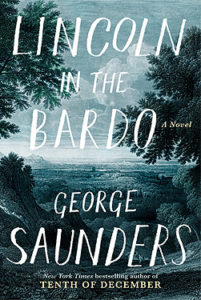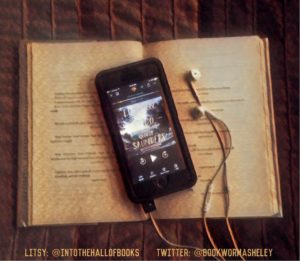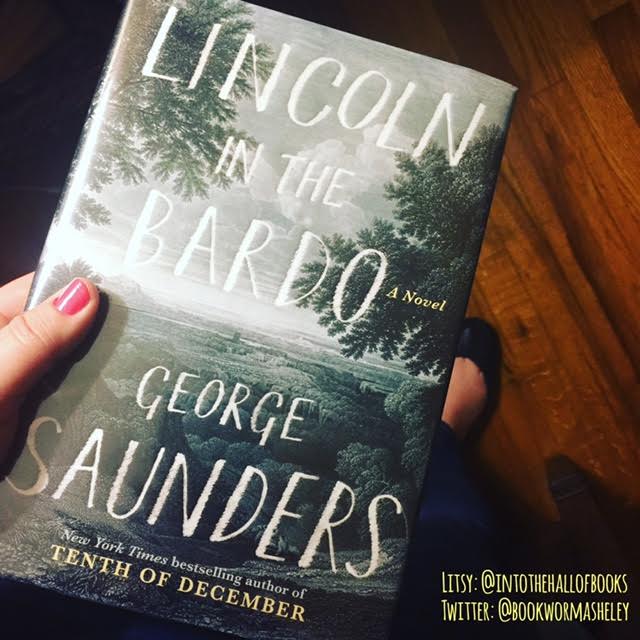 Lincoln in the Bardo by George Saunders
Lincoln in the Bardo by George Saunders Published by Random House on February 14th 2017
Pages: 343
Buy from Amazon|Buy from Barnes & Noble|Buy from Book Depository
Goodreads

The captivating first novel by the best-selling, National Book Award nominee George Saunders, about Abraham Lincoln and the death of his eleven year old son, Willie, at the dawn of the Civil War.
On February 22, 1862, two days after his death, Willie Lincoln was laid to rest in a marble crypt in a Georgetown cemetery. That very night, shattered by grief, Abraham Lincoln arrives at the cemetery under cover of darkness and visits the crypt, alone, to spend time with his son’s body.
Set over the course of that one night and populated by ghosts of the recently passed and the long dead, Lincoln in the Bardo is a thrilling exploration of death, grief, the powers of good and evil, a novel - in its form and voice - completely unlike anything you have read before. It is also, in the end, an exploration of the deeper meaning and possibilities of life, written as only George Saunders can: with humor, pathos, and grace.
Why I Read it:
Lincoln In The Bardo by George Saunders has had some serious airtime in my Litsy feed and I know that it has had tons of hype and buzz since before its publications date. It grabbed my attention because Abraham Lincoln and his son Willie are major characters – I have always been very interested in not only Abraham Lincoln but this period of time in American History. When I saw a copy on the New Books shelf at my library, I grabbed it and decided to go ahead and give it a go.
my Review:
Grief and loss. This is a book about grief and loss, and those two things happen in different ways with pretty much every character throughout the story. The way the themes are woven throughout is marvelous and so very discussable.
Even so, I’m genuinely confused about what just happened here – because I absolutely loved some parts of this book and other parts left me with a what-the-heck-did-I-just-read feeling.
I felt like these were the main things happening in the story:
- President Abraham Lincoln grieves the loss of his son, Willie, and tries to keep up appearances while the American Civil War is going on. It is 1862.
- Willie is laid to rest in a nearby crypt, where he finds himself stuck in the “bardo” which is an in-between place. Willie is essentially stuck between the moment of his death and the moment he moves onto the next place, which – in this novel – means heaven, since he is just a young 11-year-old boy.
- There are a ton of other ghosts hanging out in the bardo too, so most of this book takes place in the graveyard. Willie joins them there while he waits for the times when his father will come visiting him in the crypt. The ghosts are watching what is taking place between President Lincoln and Willie, and they’re feeling things and remembering things for the first time in a very long time. Some of them have been stuck in this place for quite some time.
I love the way Mr. Saunders sets up his novel: in the midst of the war, life goes on for the Lincoln family. They keep up appearances and continue to throw their dinner parties (even while trying to stick to a budget because, you know, the nation is at war). Meanwhile, Willie is tucked into bed upstairs, dying. Mr. Saunders uses a non-narrative format and this method works remarkably well to set up the story in terms of place and time, even if it is distracting because of all of the notations.
I wasn’t expecting to feel as emotional as I did when President Lincoln begins to grieve Willie. Lincoln goes to the crypt where his son’s body is held – alone, late at night – and spends time there. Grieving. Crying. Talking to his child. He even takes him out of his coffin and holds him. That time spent and the words that he speaks to his child moved me to tears. In fact, every time there was an interaction like this, I read it over and over before moving onto the next chapter. Likewise, Willie’s reactions to his father were very moving. Mr. Saunders writes grief and loss very, very well in this story. It may have been more easy for me to visualize these scenes because I had seen this book trailer:
But this book isn’t all grief and loss. There is humor throughout the story. (For example, there is poop talk in the first chapter that had me laughing out loud. Then when I thought about it a second time, I realized how the poop humor was funny but also really sad. This is doggone good writing.) I also think that most of the time spent with the large secondary cast of ghosts is just confusing and odd. In nearly all of those scenes, I felt my mind wandering from the book when I really just wanted to be reading more about President Lincoln and Willie or the other main narrators, Hans Vollmer and Roger Bevins III. In fact, I think that as the book progressed, it became more and more confusing and odd to me so that by the time I neared the end, I had lost interest in the vast majority of the characters.
By the end, I really only cared about President Lincoln, Willie, and the two main narrators Hans Vollmer and Rogers Bevins III. I wanted to know what happened with them, but otherwise I just wanted to be finished with this story.
audiobook notes:
 I think that pairing the print copy with the audiobook is the way to go with tackling this book. The audio goes a long way in offsetting the distraction of the notations in the print format. Don’t get me wrong – the notations are still there and they’re still distracting, but the cast of narrators does such a great job with reading all of the various parts that I found myself ignoring the notations. Of course, with a group of over 160 narrators, some will obviously be better than others and some are clearly not voice actors at all (but these people generally read very small parts). I can’t speak highly enough of Nick Offerman’s reading of his own part and of the times when he read the words and thoughts of President Lincoln. Nick’s characterization of Lincoln was my favorite thing about this entire book and I found that of all of the things that I reread (via audio), these parts were at the top.
I think that pairing the print copy with the audiobook is the way to go with tackling this book. The audio goes a long way in offsetting the distraction of the notations in the print format. Don’t get me wrong – the notations are still there and they’re still distracting, but the cast of narrators does such a great job with reading all of the various parts that I found myself ignoring the notations. Of course, with a group of over 160 narrators, some will obviously be better than others and some are clearly not voice actors at all (but these people generally read very small parts). I can’t speak highly enough of Nick Offerman’s reading of his own part and of the times when he read the words and thoughts of President Lincoln. Nick’s characterization of Lincoln was my favorite thing about this entire book and I found that of all of the things that I reread (via audio), these parts were at the top.
I’m not entirely sure that I would spend an Audible credit on this book again; I think I would have tried to be more patient with my library’s insanely long wait list for the audiobook. The sample provided on Audible is in no way able to provide an adequate representation of what this audiobook sounds like – that isn’t to knock Audible or the voice actors at all, but with a cast as large as this one and with a structure as unique, a few short minutes of sample time just isn’t adequately representative. Overall, this is one of the most unique audiobooks that I’ve ever listened to and even when I wasn’t enjoying the story very much, I loved listening to the narrators’ performances. Including and especially Nick Offerman, some of my favorite narrators were: David Sedaris, Keegan-Michael Key, Don Cheadle, Bahni Turpin, Kirby Heyborne as Willie Lincoln. You can find a list of the narrators and their parts here.




Leave a Reply